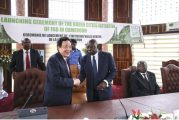Categories
Recent Posts
- Biya regime delays bond sale amid regional market strain
- Historic agreement between Nigeria and Cameroon to tackle wildlife crime
- Southern Cameroons refugees in Nigeria receive farm seedlings
- Douala: Investment Forum wraps up with honors for investment champions
- Understanding the Biya Francophone regime’s support for the Israeli genocide in Gaza
Archives
- April 2024
- March 2024
- February 2024
- January 2024
- December 2023
- November 2023
- October 2023
- September 2023
- August 2023
- July 2023
- June 2023
- May 2023
- April 2023
- March 2023
- February 2023
- January 2023
- December 2022
- November 2022
- October 2022
- September 2022
- August 2022
- July 2022
- June 2022
- May 2022
- April 2022
- March 2022
- February 2022
- January 2022
- December 2021
- November 2021
- October 2021
- September 2021
- August 2021
- July 2021
- June 2021
- May 2021
- April 2021
- March 2021
- February 2021
- January 2021
- December 2020
- November 2020
- October 2020
- September 2020
- August 2020
- July 2020
- June 2020
- May 2020
- April 2020
- March 2020
- February 2020
- January 2020
- December 2019
- November 2019
- October 2019
- September 2019
- August 2019
- July 2019
- June 2019
- May 2019
- April 2019
- March 2019
- February 2019
- January 2019
- December 2018
- November 2018
- October 2018
- September 2018
- August 2018
- July 2018
- June 2018
- May 2018
- April 2018
- March 2018
- February 2018
- January 2018
- December 2017
- November 2017
- October 2017
- September 2017
- August 2017
- July 2017
- June 2017
- May 2017
- April 2017
- March 2017
- February 2017
- January 2017
- December 2016
- November 2016
- October 2016
- September 2016
- August 2016
- July 2016
- June 2016
Featured
 Understanding the Biya Francophone regime’s support for the Israeli genocide in Gaza
Understanding the Biya Francophone regime’s support for the Israeli genocide in Gaza  Poverty under Biya: Cameroonians embrace Chinese language for brighter futures
Poverty under Biya: Cameroonians embrace Chinese language for brighter futures  Cameroon is broken: Who can fix it?
Cameroon is broken: Who can fix it?  Ethiopia: U.S Senator Cardin Statement on the Killing of Bate Urgessa
Ethiopia: U.S Senator Cardin Statement on the Killing of Bate Urgessa  Battle for the Unity Palace: ANNOUNCEMENT!
Battle for the Unity Palace: ANNOUNCEMENT!
Most Commented Posts
 4 Anglophone detainees killed in Yaounde
4 Anglophone detainees killed in Yaounde
19 comments Chantal Biya says she will return to Cameroon if General Ivo Yenwo, Martin Belinga Eboutou and Ferdinand Ngoh Ngoh are sacked
Chantal Biya says she will return to Cameroon if General Ivo Yenwo, Martin Belinga Eboutou and Ferdinand Ngoh Ngoh are sacked
13 comments Anglophone Nationalism: Barrister Eyambe says “hidden plans are at work”
Anglophone Nationalism: Barrister Eyambe says “hidden plans are at work”
12 comments The Anglophone Problem – When Facts don’t Lie
The Anglophone Problem – When Facts don’t Lie
12 comments Largest wave of arrest by BIR in Bamenda
Largest wave of arrest by BIR in Bamenda
10 comments
Latest Tweets
Featured
-

Biya regime delays bond sale amid regional market strain
-

Historic agreement between Nigeria and Cameroon to tackle wildlife crime
-

Southern Cameroons refugees in Nigeria receive farm seedlings
-

Douala: Investment Forum wraps up with honors for investment champions
-

Understanding the Biya Francophone regime’s support for the Israeli genocide in Gaza
-

US: Prosecution lays out ‘criminal conspiracy’ as Trump’s hush money trial opens
-

FAO formally launches Green Cities Initiative in Cameroon
© Cameroon Concord News 2024
18, August 2022
The international community has failed to adequately respond to years of deadly conflict in Ambazonia 0
Populations in the Anglophone north-west and south-west regions of Cameroon remain at risk of atrocities amidst ongoing clashes between government forces and armed separatist groups. On 11 August Human Rights Watch reported that between 24 April and 12 June 2022 at least 10 people were summarily killed by Cameroonian security forces during military operations against armed separatists groups. During the operations soldiers burned homes and destroyed and looted health facilities and shops. Armed separatists perpetrated grave human rights abuses during the same period, including killing and kidnapping civilians. Separatists have also continued their assault on education, attacking students, teachers and schools. Human Rights Watch documented that at least 33 students and five teachers were kidnapped by armed separatists since January.
Populations in Cameroon’s Anglophone regions have faced widespread violence since tensions over cultural rights and marginalization of Anglophone populations escalated in October 2016. In the resulting clashes, government forces and armed separatist groups have perpetrated grave violations and abuses that may amount to atrocities, including extrajudicial killings, kidnappings and torture. Since the crisis began, more than 6,000 civilians have been killed and at least 666,000 displaced. Few perpetrators have been held accountable.
Since 2021 the government has intensified its attacks against armed separatist strongholds in attempts to end the conflict. During military operations, government forces have routinely targeted civilian populations for their alleged cooperation with separatist groups. Armed separatists have retaliated by using more deadly weapons, including improvised explosive devices and anti-tank rocket launchers, putting civilians at increased risk. Separatist groups have also expanded their sources of revenue through kidnapping and extortion in the north-west and south-west. Civilians are also at risk of targeted attacks by armed separatists for their suspected collaboration with the government.
Juliette Paauwe, Cameroon Expert at the Global Centre for the Responsibility to Protect, said that, “despite escalating violence, the international community has failed to adequately respond to years of deadly conflict in Cameroon. While long overdue, the African Union (AU) and the UN Security Council (UNSC) must help establish a comprehensive ceasefire to address the growing atrocity risks faced by civilian populations in the Anglophone regions.” The AU and UNSC should also facilitate an inclusive dialogue between the government, separatist groups and Anglophone communities, mediated by a neutral player on neutral territory. Security forces must end all extrajudicial killings of unarmed civilians and ensure that the human rights of all Cameroonians are equally protected, regardless of cultural identity. Armed separatist groups must also halt attacks on civilians and civilian infrastructure.
Source: reliefweb.int